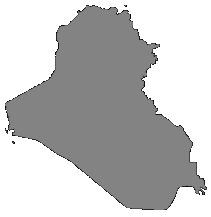
|
||
| Premiere issue | Autumn 2002 | |
Autumn 2002 Home |
| Culture/ Politics |
| Fiction |
| Film |
| Music |
| Technology |
| Theater |
| About / Contact |
| Archive |
| Current Home Page |
A mother's thoughts on war in Iraq
I find myself thinking much these days along the lines of war. Not as a politician, or foreign policy expert or particularly sagacious middle-aged female because, clearly, I am none of the above. But as a woman and more specifically, as a mother of a 17-year-old young man, the thought of a war he might be heir to hits me hard in the solar plexus.
If we, as it looks from the vantage point of today, are going to war in Iraq, he may well be directly affected. This fact brings me up short into a strange state of cognitive dissonance.
On one hand, I firmly believe in the necessity for the use of force when unavoidable, on both smaller and larger scales. On the other, I can't fathom the idea of sending my flesh and blood off into the insanity of war.
How hypocritical is that? I believe that there are times that call for war and things worth fighting for, yet I would not want to commit my own son to be fodder for the chemical or biological agents that are likely to be used in any war in Iraq.
 How can I believe in the possibility of a "just war" and yet remain uncommitted on a personal level? Must I be willing to sacrifice my son on the mountain of Mt. Moriah in order to prove the authenticity of my belief that evil cannot be negotiated with but only eradicated? I wonder.
How can I believe in the possibility of a "just war" and yet remain uncommitted on a personal level? Must I be willing to sacrifice my son on the mountain of Mt. Moriah in order to prove the authenticity of my belief that evil cannot be negotiated with but only eradicated? I wonder.
In thinking through the issue, I turn to analogy of the only science I have any familiarity with: medical science.
In her New York Times 9-11 offering, Susan Sontag contrasted the war against terrorism to the metaphorical (in her mind) war on cancer, poverty and drugs. The analogy breaks down where poverty and drugs are concerned, but I maintain that cancer is an apt metaphor. Though anyone who has faced the ravages of cancer in their own body would hardly agree that cancer is not a "real" enemy, I want to extend the metaphor to point out the similarities between the war against terrorism and the cellular terrorism of cancer.
Cancer, like terrorism, doesn't particularly care whether you believe in it or not, both are following the phase-lock reiteration of a closed system. Terrorism of both kinds doesn't take stock of whether the host organism owns up to its alleged part in "root causes." Malignancies are not famous for participation in "dialogue."
Both are following an inner script directed at the genetic level which does not know how to negotiate. Negotiation with cancer doesn't work. Appeasing it doesn't work.
If sanctions against cancer don't work and it is starting to metastasize, threatening the integrity of the rest of the body, then it is time to cut it out, burn it out and poison it into oblivion.
Contrary to what Sontag identifies as a criteria for a "real war," outcome in wars of all kinds is rarely certain.
 As in any real war with any real enemy, it is a given that there will be collateral damage. In surgical, radioactive and chemotherapeutic therapies, collateral damage can be massive. Everyone understands that. The decision to poison, burn and cut out part of your own body in hopes that it will rid you of a life-threatening malignancy is never entered into lightly. Radiation and especially chemotherapy is likely to make you much sicker before it makes you better. And not uncommonly, the cure is worse than the disease.
As in any real war with any real enemy, it is a given that there will be collateral damage. In surgical, radioactive and chemotherapeutic therapies, collateral damage can be massive. Everyone understands that. The decision to poison, burn and cut out part of your own body in hopes that it will rid you of a life-threatening malignancy is never entered into lightly. Radiation and especially chemotherapy is likely to make you much sicker before it makes you better. And not uncommonly, the cure is worse than the disease.
In the face of such odds, there are some who choose what would be considered the equivalent of the pacifist stance of non-violence instead of sickening prospects of waging an aggressive war on one's own flesh. Knowing the dogs of chemotherapy as well as I do, I can understand that choice.
Regardless, the best approach with cancer is usually the one which is both most conservative yet most effective. Like terrorist madmen, if the cancer can be removed by cutting it out cleanly then that's what you do. If further intervention is needed, you proceed carefully weighing the cost-benefit ratios of treatment.
Why is it that we cannot remove Saddam without killing thousands of Iraqi and American young men? Not to mention women and children. Why would we not, if possible with the support of what allies have the stomach for it, remove his cancerous tissue with the smallest, sharpest scalpel we have?
Instead of the equally facile philosophies of either/or; of either full-out war or the idealistic Dalai Lama-speak of indiscriminate non-violence, maybe the answer is both/and.
Both much more specific and lethal on a small scale and far less deadly and tragic on the larger? It works that way on a micro-level of human anatomy — why not, in certain instances, with nations?
Why poison the whole territory with the variegated shrapnel of war when it is preferable to remove only the ugly tumor responsible for the cellular anarchy?
It's hard to believe it cannot be done that way. Where we used to do radical mastectomies as a matter of course to combat breast cancer, now we have progressed to much more conservative and tissue-saving techniques whenever possible.
Any sort of mawkish moral outrage at the idea of surgically resecting a sarcoma of the Saddam variety in favor of sacrificing the precious flesh of a thousand mother's sons, Iraqi, American and British, is barbarous civility indeed.
Come to think of it, it's also hypocrisy of the highest order.
![]()
Autumn 2002 Culture & Politics Section | Autumn 2002 Main Page
Current Culture, Politics & Technology Section | Current Home Page
Copyright ©
Reprinted by permission of author, who retains all copyright and control.